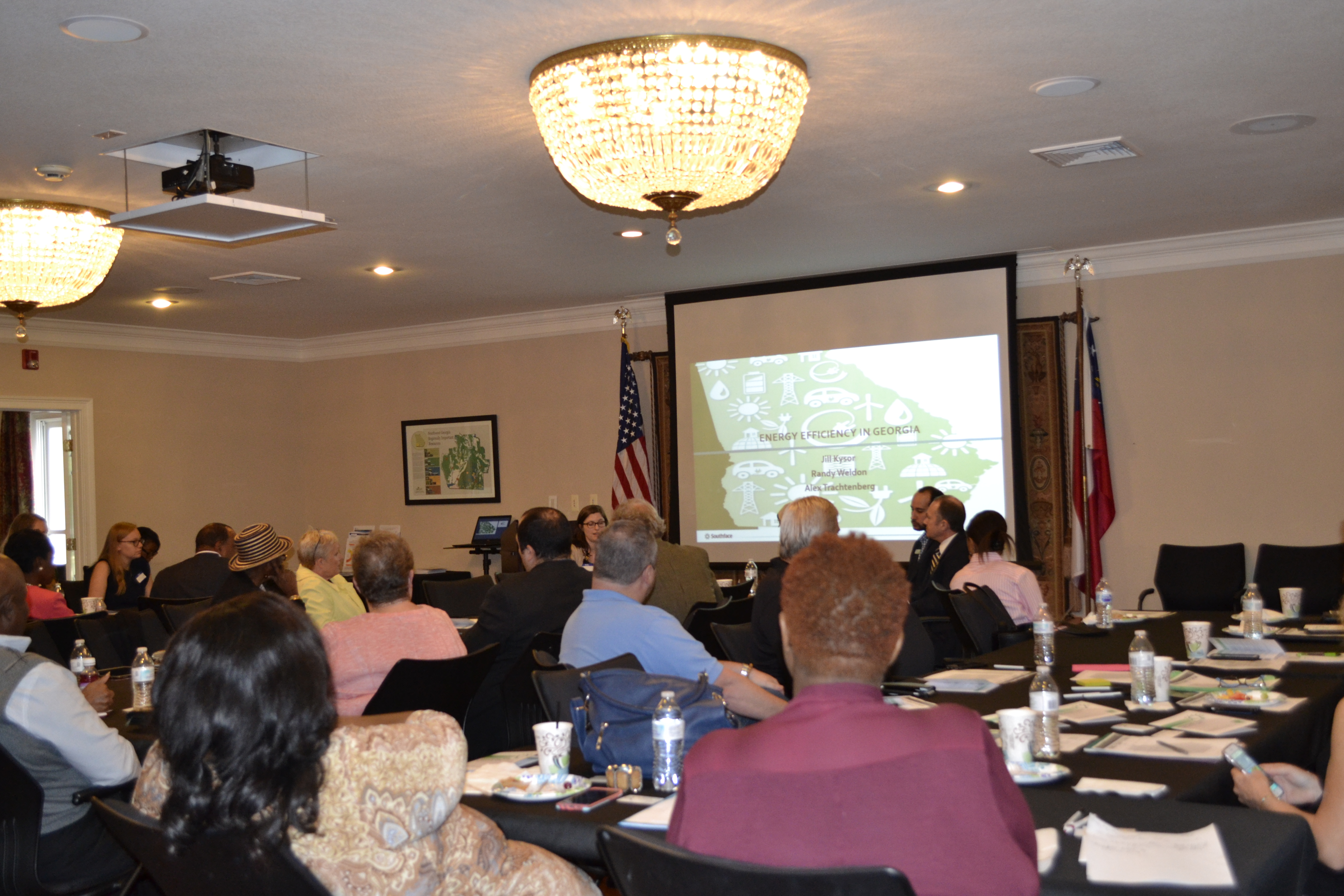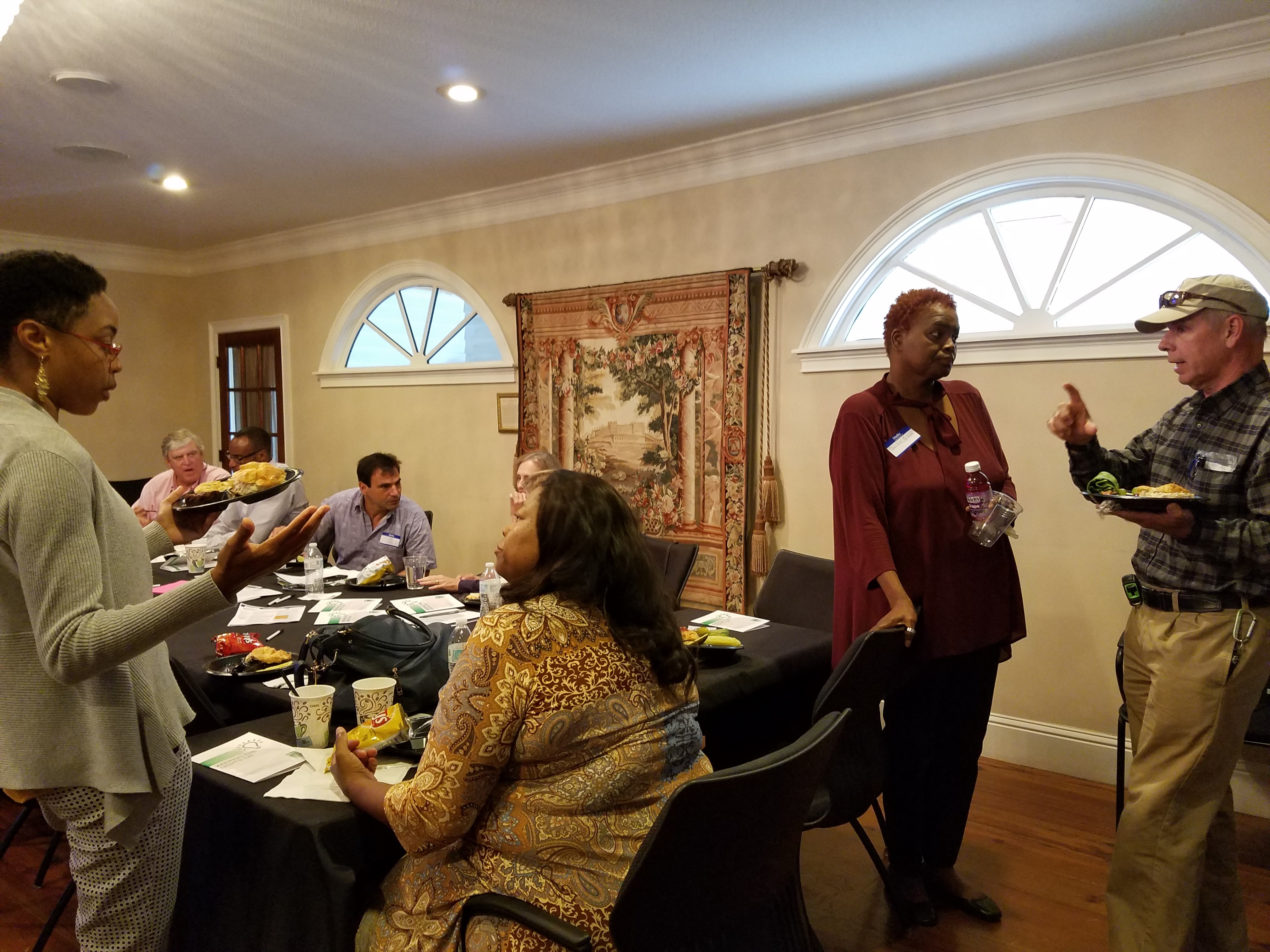As winter approaches, families in Georgia will be facing the prospect of high energy bills to warm their homes. Many low-income families living in energy inefficient homes may find themselves forced to choose between buying groceries and keeping the heat on. Some families will likely turn to high risk loans to pay their energy bills, while others may put their own health at risk by cutting back on necessary heating.
To help struggling families burdened with high energy bills, Georgia Watch and partners hosted an Energy Equity Forum on October 7, 2017 at the Southwest Georgia Regional Commission in Camilla, Georgia.
The half-day forum drew a full house of over 40 participants, from a wide range of backgrounds, and sparked a robust conversation about energy equity and access in Southwest Georgia. Participants included leaders from local utilities and Georgia Power, community action agency advocates from the region, community leaders, residents of Camilla and Albany, as well as consumer and clean energy advocates from Atlanta and outside the state. Participants learned about energy efficiency benefits for low income households, such as the Georgia Low Income Home Energy Assistance Program (LIHEAP) and Weatherization Assistance Program (WAP), and Georgia Power’s Energy Assessment & Solutions Program. An afternoon panel explored opportunities in Southwest Georgia to access solar energy.
Berneta L. Haynes, Director of Equity and Access at Georgia Watch, led the planning of the event along with Southface, Natural Resources Defense Council, Georgia Interfaith Power and Light, Southwest Georgia Community Action Council, and National Housing Trust, among others. Speakers included Frances Chowdhury (who grew up in Moultrie), Alex Trachtenberg (Southface), Randy Weldon (Southwest Georgia Community Action Council), Jill Kysor (Southern Environmental Law Center), Dawone Robinson (Natural Resources Defense Council), and Joe Bostick (Mitchell County Economic Development Authority).
The forum opened with a lively discussion about how high energy bills disproportionately impact low-income families, who often live in drafty, energy inefficient homes. Some participants spoke candidly about their high energy bills, with one Camilla resident describing the $700 monthly utility bill at her mother’s home. Throughout the day, utility leaders described some of their program offerings, including free energy audits and low-income energy efficiency programs, for families hoping to reduce their energy bills. During the solar discussion later in the day, Jimmy and Esther Jones, Camilla residents who own the only residential, rooftop solar installation in the city, spoke about why they chose to go solar. They discussed the financial difficulty of going solar in Georgia, including paying a high fixed charge on their bill every month because they installed solar panels.
The forum served not only as a conversation-starter about the high energy burden families face in Georgia, but also provided helpful information and resources to empower families to take control over their energy use. “We wanted to make sure that participants dealing with high utility bills left the forum with some sense of practical steps they could take and resources they could access to reduce their bills. People shouldn’t have to choose between keeping their lights on and buying groceries,” said Haynes.
For example, participants received free LED light bulbs and had the opportunity to speak directly with each other during a “Speed Dating / Networking” session just after lunch. Additionally, participants received copies of the consumer guide, Keeping the Lights On: Energy Efficiency and Community Solar for All Georgians, which includes information about how to participate in available weatherization programs offered by utilities and community action agencies. As an accompaniment to the forum, the guide provides useful information not only for consumers looking to lower their energy bills but also for utility leaders and advocates interested in learning how to make energy efficiency and solar accessible to families who need them the most.
Georgia Watch and our partners are looking forward to keeping this energy equity conversation going in Southwest Georgia and throughout the state. As a follow-up to the forum, Georgia Watch is developing a webinar based on the guide and will release registration details soon. “We plan to continue our involvement in Southwest Georgia and grow the relationships we’ve seeded there over the last few months,” said Haynes.
If you would like to learn more about how to lower your energy bills, please see 10 Easy Ways to Save Money on Your Utility Bills, Saving Money on Your Utility Bills, or contact Berneta L. Haynes at bhaynes@georgiawatch.org to find out how to host or participate in a “How to Save Money on Your Utility Bills” workshop.


